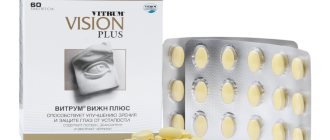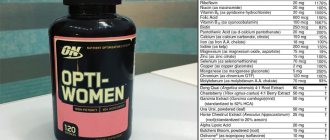It's no secret that the body requires a lot of useful substances to function normally. Their deficiency can negatively affect your well-being and appearance, so it is important to constantly receive all the necessary substances in sufficient quantities. Many of them are not synthesized by the body itself; they enter it from the outside along with food, but this may not be enough. For example, to get the daily requirement of vitamin C, you need to eat 15 kilograms of oranges or 24 tomatoes. But there is another way: you can take a course of vitamins, in which all the beneficial substances are in concentrated form. But which vitamin and mineral complex to choose from the huge variety? Let's figure out what vitamins are needed for what.
How many vitamins are in vitamins?
All vitamin and vitamin-mineral complexes can be divided into three main groups based on vitamin content. 1. Complexes that contain 30-50 percent of the recommended daily intake
(RDI) for humans.
All about vitamins
Almost everyone needs multivitamin complexes. We tell you what you need to know about vital substances, why they are needed, how hypovitaminosis manifests itself, and why it is best to drink multivitamins.
2. Complexes containing
almost the entire dose
of recommended daily intake.
3. Complexes with a high content of vitamins - more than 100 percent of the RNI
. Moreover, the content of vitamins E and C in such complexes can be 10 times higher than the RNI, that is, reach 1000 percent of the RNI, and the content of other vitamins ranges from 100 to 300 percent of the RNI.
Vitamins needed for an organism affected by osteochondrosis
For osteochondrosis and other cartilage pathologies, complex vitamin therapy is useful. This complex includes the following vitamins.
Table. Vitamin complex necessary for osteochondrosis.
| Vitamin | Description |
| Vitamin A (retinol) | Designed to make cartilage stronger, participates in the body's production of blood. |
| Vitamin D (calciferol) | It is necessary for better calcium accumulation in the skeletal system, which is best helped by D3. |
| Vitamin C (well-known ascorbic acid) | Necessary for removing toxins, improving immunity, protecting tissues, faster healing, and also as an anti-inflammatory component. |
| Vitamin E | Needed by the body as an antioxidant. |
| B vitamins | Include: • B1 (thiamine), to improve the immune system, improve nerve nutrition and protein metabolism; • B2 (riboflavin), in order to make cartilage elastic; • B6 (pyridoxine), to increase immunity, as well as physical strength; • B12 (cyanocobalamin), which stops inflammatory processes and returns metabolism to normal. |
Different doses...
the smallest doses
of vitamins.
But as the child grows, they increase. women
require the most vitamins , because their body during this entire period is the only source of vitamins for the baby.
In addition, the need for vitamins increases in older people
, since the absorption of nutrients in their bodies deteriorates with age.
Taking these features into account, there are vitamin complexes on the market intended for people of different ages, as well as for women during pregnancy or lactation. That is, the set of vitamins remains the same, and only their doses change
, corresponding to the needs of people from a particular group.
Other means
All of these drugs are the medications that doctors recommend most often. Experts recommend them in order to give the patient’s body the necessary substances, most of all this concerns B vitamins.
Doctors also prescribe other useful remedies. For example:
- "Combilipen";
- "Unicap";
- "Magne B6";
- "Magnelis B6";
- "Neurobion";
- "ATF-long";
- "ATF-forte".
Important! There are still a great variety of means. So the remedy, method of administration, as well as dosage should be prescribed by a specialist. It is necessary to make adjustments to the daily menu in order to consume foods rich in vitamins, getting them from food.
Attention: in order to achieve sustainable results, as well as prevent the acute phase of osteochondrosis, you must achieve the following:
- cessation of degenerative processes;
- stimulation of regeneration in tissues;
- preventing inflammation.
To do this, it is necessary to use vitamins as well as metabolic agents.
How to read the label correctly?
When choosing vitamins yourself, you need to carefully study the label. It is better to choose a complex containing the entire list of vitamins
.
Pay special attention to their content in one tablet. It is usually indicated as a percentage of the RPN (or RDA, if the complex is manufactured in another country). When purchasing your first complex,
give preference to those whose content of all vitamins in one tablet is close to 100 percent. They are taken in courses for one month. During this time, the level of vitamins in the body will reach normal levels, and then you can switch to a complex with a lower content.
Side effects
Important! With an overdose of vitamins, which is fraught with excessive consumption, you can get hypervitaminosis. It is harmful to the body.
Short-term hypervitaminosis is not dangerous. Long is another matter. It greatly increases the likelihood of tumors. In addition, it may be fraught with diseases of the entire body. For example:
- hypertension;
- worsening allergies;
- stones in the kidneys;
- the appearance of cholesterol plaques;
- problems with the nervous system.
Should you believe the advertising?
“At the moment, science knows only 13 vitamins
,” says Kodentsova, “so when advertising claims that a vitamin complex or dietary supplement contains 49 vitamins, then, of course, this is not true.”
Natural vitamins
The human body receives vitamins not only from vegetables and fruits, but also from animal products and other unexpected sources.
Vitamins in doses contained in conventional vitamin-mineral complexes
cannot in any way be considered a medicine
. They simply ensure the vitamin content of the diet and reduce the risk of vitamin deficiency. You should not expect that their use will cure eye diseases, hair diseases or other chronic diseases. However, taking vitamins will provide a favorable background for the treatment of any ailment.
How to understand what vitamins you need
But even knowing the purpose of each vitamin, it can be difficult to understand what exactly your own body needs. Here are some tips to help you understand what you need and how to choose a vitamin supplement so you don't miss out on important elements for your health:
- If you cannot bend your fingers together so that they touch your palm without bending your hand into a fist and extending it with the back side down, you most likely do not have enough vitamin B6;
- frequent dizziness and tinnitus may be due to a deficiency of B3 and E, as well as a lack of potassium and magnesium;
- if your ability to navigate in the dark has weakened, and the redness of the eyes does not go away for a long time, this indicates a lack of B2 and A;
- insomnia can be caused by a lack of B vitamins, as well as calcium and potassium;
- muscle weakness, cramps at night and pain in the legs may be dull and brittle hair indicate a deficiency of B3, B9 and C, dandruff appears as a result of a deficiency of B6 and B12;
- persistent inflammation on the face and acne indicate a lack of vitamins B and A; severe dry skin also indicates an insufficient amount of the latter;
- if fractures and wounds take a long time to heal, most likely there is not enough vitamin C, and the bones also lack calcium.
What does the doctor think?
“Symptoms of vitamin deficiency include a decrease in a person’s functional reserves. A person may notice that at the same pace of life he gets tired faster, the number of infectious diseases has increased, his well-being decreases, etc.”
These are not all the symptoms of a lack of vitamins and minerals in the body, so if you suspect a deficiency of any of them, it would be better to consult a doctor.
Instructions for choosing a vitamin complex
If you are choosing your own multivitamin, first purchase a complex that contains about 100 percent of your daily requirement for all vitamins, as well as essential minerals.
Vitamin complexes may contain only 13 vitamins; more do not exist in nature. But in what form they are presented - in the form of tablets, syrup or marmalade - it does not matter. Tags:
- Vitamins
- Avitaminosis
- Diagnostics
To leave a comment you must be an authorized user
Who is responsible for what
You need to start choosing vitamin complexes by studying their composition in order to know exactly what each element will affect. Here are the most common components of such complexes:
- vitamin C - is a very strong antioxidant, helps in healing wounds, lowering cholesterol, fights infections, and participates in the process of synthesis of new tissues, cells and collagen;
- L – arginine – participates in wound healing, removal of decay products from the kidneys, dilation of vascular walls, strengthens the immune system;
- L – lysine – participates in collagen synthesis, improves calcium absorption, lowers cholesterol levels, and is also used in the treatment and prevention of herpes, helps restore the body after training;
- Omega 3 fatty acids – have a positive effect on the functioning of the cardiovascular system, joints and ligaments, help in the treatment of various types of dermatitis, help normalize blood circulation, stimulate the reproductive system, and also slow down the aging process of the skin.
- vitamin A - improves the condition of the skin, vision, hair and nails, helps maintain joint mobility, enhances the body's protective functions, increases its resistance to infections and toxins;
- vitamin D - it is also called growth vitamin, because its main purpose is to help in the absorption of calcium and phosphorus, it is responsible for strengthening teeth and bones, and also stimulates the synthesis of a number of hormones;
- vitamin E - slows down the aging process, participates in the production of hemoglobin, prevents the formation of blood clots, helps normalize blood pressure, is also an antioxidant and protects cells from the effects of carcinogens;
B vitamins are involved in all important processes occurring in the human body, their properties are largely similar, however, each has its own responsible task:
- B1 (thiamine) – participates in the metabolism of fats and carbohydrates, normalizes the activity of the nervous system, heart and blood vessels, has a positive effect on the functioning of the intestines and stomach;
- B2 (riboflavin) - participates in the process of protein metabolism, just like vitamin A is responsible for the condition of the skin and vision, helps normalize the activity of the nervous system;
- B3 (niacin), B7 (biotin) - improve metabolic processes, tissue respiration, blood circulation and digestion, reduce cholesterol and dilate blood vessels. Biotin is also involved in the transport of carbon dioxide;
- B 12 (cyanocobalamin), as well as B5 (pantothenic acid) - normalize the functioning of the adrenal glands, peripheral and central nervous systems, participate in the production of antibodies and hemoglobin. B5 alone improves the activity of the heart muscle, stomach and duodenum;
- B6 (pyridoxine), B9 (folacin) - are involved in the processes of bone marrow hematopoiesis, the synthesis of proteins and nucleic acids. Folacin is extremely necessary for a child during intrauterine development.
- B10 (para-aminobenzoic acid) – activates the intestinal flora, protects against ultraviolet radiation, slows down skin aging and graying, increases immunity to viruses and infections;
- B11 (L-carnitine) – promotes blood clotting and platelet production, participates in fat burning in metabolic processes, and is responsible for the condition of hair and skin.
To choose a good vitamin complex, in addition to these components, you should also take into account the minerals that are included in its composition. It can be:
- magnesium – helps normalize blood pressure, strengthens bone strength, and participates in the process of muscle contraction;
- iron – takes part in the production of hemoglobin, helps deliver oxygen to blood cells;
- calcium is an important component of bones and teeth; it is needed for transmitting signals from the nervous system, secreting hormones and muscle contractions;
- zinc – improves immunity, improves metabolism, promotes skin restoration and wound healing;
- potassium – normalizes heart rate, the condition of ligaments and tendons, regulates fluid balance in the body;
- Phosphorus – its main function is to strengthen teeth and bones.



